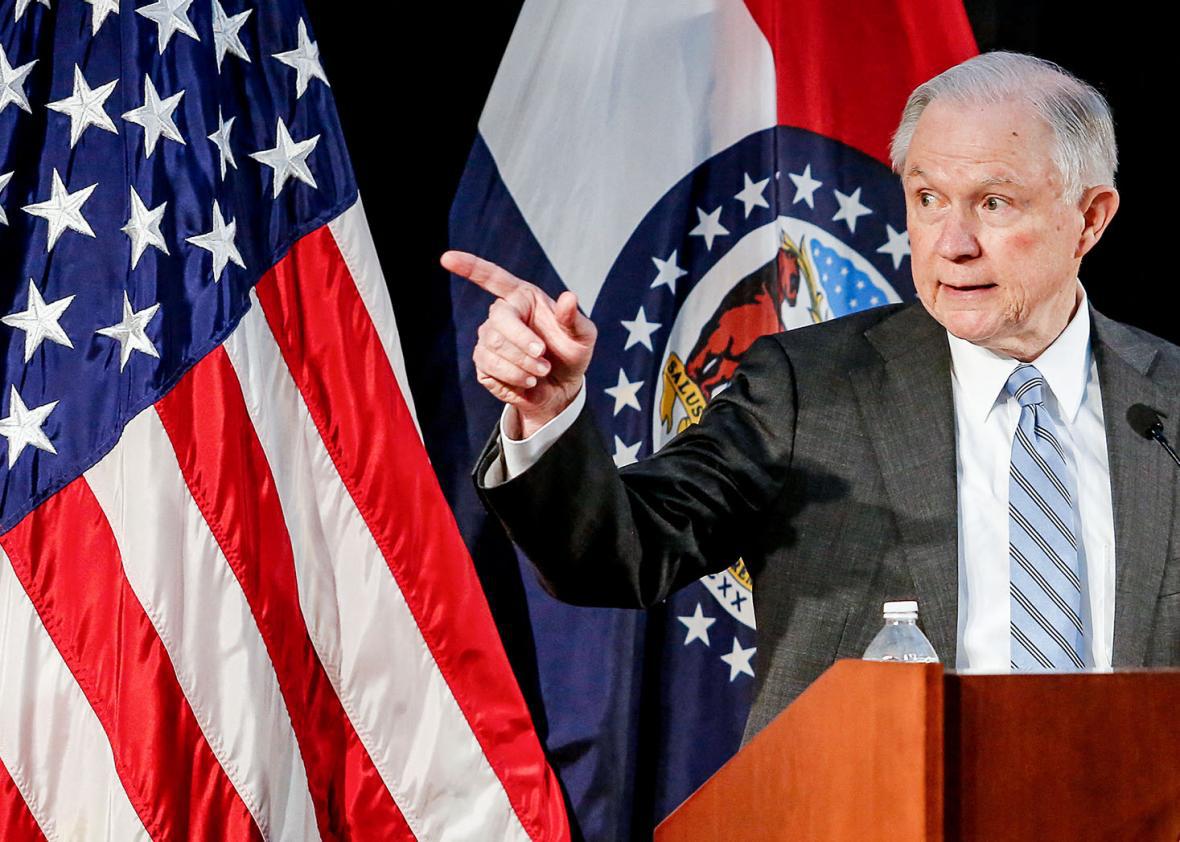It’s no secret that Jeff Sessions is hostile to federal oversight of state and local law enforcement. In his time on the job thus far, the attorney general has blamed rising crime rates on criticism of the police and disparaged Obama-era reports on police misconduct in places like Ferguson, Missouri, and Chicago, Illinois. “One of the big things out there that’s, I think, causing trouble, and where you see the greatest increase in violence and murders in cities, is somehow, some way, we undermined the respect for our police and made, oftentimes, their job more difficult,” Sessions said in February in a typical analysis.
Now, the New York Times reported on Monday, Sessions is bringing those views to bear on the Department of Justice, aligning the agency with his rhetoric. In particular, the attorney general has ordered a full review of all of the DOJ’s consent decrees reached with police departments under President Obama and Sessions’ predecessor Loretta Lynch. For Sessions, these agreements are a burden on law enforcement and an abuse of federal authority. Blaming police reform for an uptick in violent crime rates, Sessions wants to end federal oversight of local and state police, as part of his—and President Trump’s—drive for “law and order.”
A key legacy of the Obama administration, these agreements were part of an aggressive effort to improve relations between police departments and the communities they serve. Critically, consent decrees were part of a larger process that also produced detailed investigations of the police departments in question, meticulous documents that brought reporting and data analysis to bear on claims of police abuse and dysfunction. In Ferguson, for instance, Department of Justice investigators uncovered a long pattern of discrimination and harassment on the part of the city, its police, and its municipal officials. In particular, police were tasked with collecting fines and other revenue from the area’s black residents, levying unnecessary fees, and harassing black drivers and pedestrians for minor infractions. Ferguson officials openly discussed how to extract wealth from black residents, and local courts leaned into this scheme, harshly punishing those who couldn’t pay trumped up fines or respond to purposefully obtuse warnings.
In his memorandum announcing a review of the department’s consent decrees, Sessions insisted that taking a look at these agreements aligns with principles put forth by the Trump administration, including one that “the individual misdeeds of bad actors should not impugn” the work of entire departments. This is also in line with Sessions’ larger view on federal oversight of local and state law enforcement. But, even as he dismisses evidence of police abuse as “anecdotal,” the Justice Department’s own work belies that view. For example, a more recent investigation, of the Chicago Police Department, found a deeply troubled agency, with officers who engaged in “a pattern or practice of using force, including deadly force, that is unreasonable.” These findings, wrote investigators, were “based on a comprehensive investigation of CPD’s force practices and a close analysis of hundreds of individual force incidents.” And this unjustified and unconstitutional use of force has been compounded by a profound lack of accountability within the department, with little or no responsiveness to complaints of abuse and indifference to police efforts to conceal or manipulate evidence and even lie outright in cover-up attempts.
In other words, Sessions is simply wrong. Without consent decrees and their attendant investigations—without the threat of federal involvement—there’s little direct incentive for cities and states to confront abusive, dysfunctional police departments. If that doesn’t happen, there is definitely no stopping those “bad actors” (and the officials who enable them) from running roughshod over the constitutional rights of American citizens and black Americans in particular.
Sessions, it should be said, isn’t the first attorney general to take a distinct lack of interest in securing the rights of minorities from local abuse and lawlessness. Yet his actions—and his insistence on a kind of states’ rights for law enforcement—is striking, given the Justice Department’s history.
Founded in 1870, during the effort to rebuild and reconstruct the South, the Department of Justice was quickly tasked with implementing the Enforcement Acts. These were a series of laws passed in 1870 and 1871 to protect the civil and voting rights of newly enfranchised black Americans and crack down on the epidemic of white vigilantism that threatened the stability of Reconstruction governments. Empowered by Congress and the White House, New Hampshire–born Attorney General Amos T. Akerman utilized federal machinery to supervise local elections and stop abuse of black voters from groups like the Ku Klux Klan.
The Department of Justice hasn’t always lived up to its history. But it’s there, part of the agency’s past. And it’s no exaggeration to say that Jeff Sessions has jettisoned that commitment in service of a larger agenda that, if other evidence is any indication, is antithetical to the vision of a pluralistic, inclusive United States. Sessions, recall, was an early defender of Donald Trump’s call for a “Muslim ban” during the campaign, and his former aide Stephen Miller was a key force behind the administration’s initial travel ban in January.
If there’s a silver lining, it’s that cities like Chicago and Baltimore—whose leaders also pursued an agreement with the DOJ—are committed to change and want to move forward with reform even as Sessions signals opposition. Still, the broad story is of an attorney general—and an administration—with no real interest in challenging police misconduct. And beyond policing lies voting rights and ballot access, where official hostility is even more pronounced.
Nearly 150 years after the Department of Justice was founded to, in part, protect the rights and privileges of formerly enslaved Americans, we now have an attorney general who is committed to undermining that legacy of fairness and equality.
